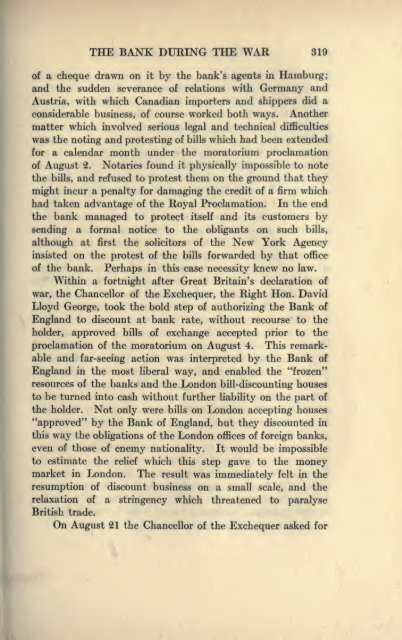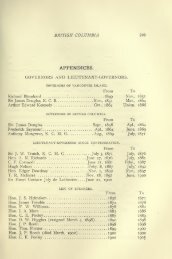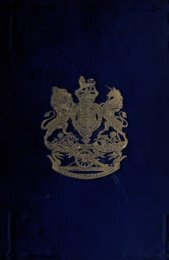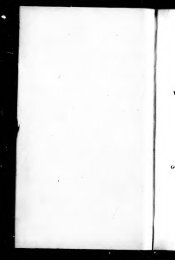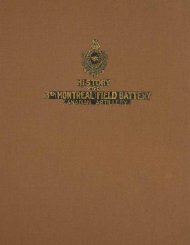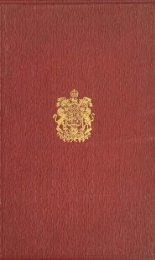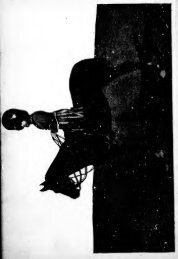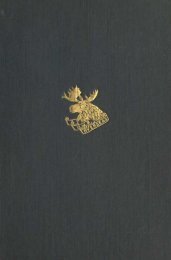- Page 7:
A HISTORYOFTHE CANADIAN BANKOF COMM
- Page 11 and 12:
A HISTORYOFTHE CANADIAN BANKOF COMM
- Page 13 and 14:
PREFACE[S volume closes at the end
- Page 15:
PrefaceContentsIllustrationsCHAPTER
- Page 18 and 19:
xILLUSTRATIONSPLATENO.FACINGPAGE25
- Page 20 and 21:
XllILLUSTRATIONSNO.63 TCamloops, B.
- Page 24 and 25:
IPLATtIHI Hov \\II.I.I\M M.MASTERFi
- Page 26 and 27:
2 HISTORY OF THE BANKbrought about
- Page 28 and 29:
4 HISTORY OF THE BANKthat, because
- Page 30 and 31:
6 HISTORY OF THE BANKtain the usual
- Page 33 and 34:
THE CHARTER 7the Grand Trunk Railwa
- Page 35 and 36:
THE CHARTER 9proposed bank was to s
- Page 37 and 38:
THE CHARTER 11province or secured b
- Page 39 and 40:
THE CHARTER 13enterprise, perhaps t
- Page 41:
I'I.VTI-: No. |.rilAKLOTTKTCNYN. IV
- Page 44 and 45:
16 HISTORY OF THE BANKpresently be
- Page 46 and 47:
18 HISTORY OF THE BANKMontreal, or
- Page 49 and 50:
THE CHARTER 19financial and commerc
- Page 51 and 52:
THE CHARTER 21of London, 9 who had
- Page 53 and 54:
THE CHARTER 23many of them stand ve
- Page 55 and 56:
THE CHARTER 25drew on the Mancheste
- Page 57 and 58:
THE CHARTER 27Confederation, Mr. Ro
- Page 59 and 60:
THE CHARTER 29Company. It is signif
- Page 61 and 62:
THE CHARTER 31opposition that at ti
- Page 63 and 64:
THE CHARTER 33made its appearance,
- Page 65:
PLATE No. C.EDMONTON, ALTA.
- Page 68 and 69:
36 HISTORY OF THE BANKarrival of Lo
- Page 70 and 71:
38 HISTORY OF THE BANKinto in Novem
- Page 72 and 73:
40 HISTORY OF THE BANKis certain, I
- Page 74 and 75:
42 HISTORY OF THE BANKlater he anno
- Page 76 and 77:
44 HISTORY OF THE BANKCanada banks,
- Page 78 and 79:
46 HISTORY OF THE BANKConservative
- Page 83 and 84:
CHAPTER II.1867 TO 1901.We may now
- Page 85 and 86:
1867 TO 1901 51to open an account w
- Page 87 and 88:
1867 TO 1901 53committee to select
- Page 89:
-3* IX ;-- rii8111'l.ATK No. 7.
- Page 92 and 93:
56 HISTORY OF THE BANKas scrutineer
- Page 94 and 95:
58 HISTORY OF THE BANKtime contribu
- Page 96 and 97:
60 HISTORY OF THE BANKeven terms wi
- Page 98 and 99:
62 HISTORY OF THE BANKwere $32,003,
- Page 101 and 102:
1867 TO 1901 63The opening of the N
- Page 103 and 104:
1867 TO 1901 65and bamboo wares, st
- Page 105:
I'l.VPK No. !).NEW YORK, X.Y.
- Page 108 and 109:
68 HISTORY OF THE BANKwith Great Br
- Page 110 and 111:
70 HISTORY OF THE BANKParkhill. Win
- Page 112 and 113:
72 HISTORY OF THE BANKSaskatchewan
- Page 114 and 115:
74 HISTORY OF THE BANKmoney. The Am
- Page 116 and 117:
76 HISTORY OF THE BANKelected to su
- Page 118 and 119:
78 HISTORY OF THE BANKequalled. Alt
- Page 120 and 121:
80 HISTORY OF THE BANKThe minute bo
- Page 122 and 123:
82 HISTORY OF THE BANKcontaining $1
- Page 125 and 126:
1867 TO 1901 83Dunclas branch, the
- Page 127 and 128:
1867 TO 1901 85sequences; on the ot
- Page 129:
PLATE No. 11.us
- Page 132 and 133:
88 HISTORY OF THE BANKGreat Britain
- Page 134 and 135:
90 HISTORY OF THE BANKof the Provin
- Page 136 and 137:
92 HISTORY OF THE BANKare quoted in
- Page 138 and 139:
94 HISTORY OF THE BANKthe officers
- Page 141 and 142:
1867 TO 1901 95front door of the of
- Page 143 and 144:
1867 TO 1901 97Darling, 1president
- Page 145:
( OUNKR OF KING AND JORDAN STREETS,
- Page 148 and 149:
100 HISTORY OF THE BANKsite was ere
- Page 150 and 151:
102 HISTORY OF THE BANKpublic caree
- Page 153 and 154:
1867 TO 1901 103this examination ha
- Page 155 and 156:
1867 TO 1901 105As a guide for the
- Page 157 and 158:
1867 TO 1901 107chosen to succeed M
- Page 159 and 160:
1867 TO 1901 109January, 1887. Her
- Page 161:
PLATE No. 15.REGINA, SASK.
- Page 164 and 165:
112 HISTORY OF THE BANKIn his actio
- Page 166 and 167:
114 HISTORY OF THE BANKby the death
- Page 169 and 170:
1867 TO 1901 115stood to favour cha
- Page 171 and 172:
1867 TO 1901 117James Stevenson 1of
- Page 173 and 174:
1867 TO 1901 119Bank of Commerce at
- Page 175 and 176:
1867 TO 1901 121shareholders that t
- Page 177 and 178:
1867 TO 1901 123It will be evident
- Page 179 and 180:
in conjunction with Mr. J. O. Bigel
- Page 181 and 182:
1867 TO 1901 127wood, in British Co
- Page 183 and 184:
These figures show the fresh life18
- Page 185:
PLATE No. 17.SAN FRANCISCO, CAL.
- Page 188 and 189:
132 HISTORY OF THE BANKtifii0094- -
- Page 190 and 191:
134 HISTORY OF THE BANKDecember 6,
- Page 193:
and Mr. W. E. H. Massey.11867 TO 19
- Page 197 and 198:
CHAPTER III.THE YUKON ADVENTURE.Som
- Page 199 and 200:
THE YUKON ADVENTURE 139them to hand
- Page 201:
139 138 137* 135 134of Country betw
- Page 204 and 205:
142 HISTORY OF THE BANKexploits of
- Page 207 and 208:
THE YUKON ADVENTURE 143point at tid
- Page 209 and 210:
THE YUKON ADVENTURE 145who had been
- Page 211:
LAKE BENNETT, Y.T.The first Canadia
- Page 214 and 215:
148 HISTORY OF THE BANKportage was
- Page 216 and 217:
150 HISTORY OF THE BANKstrong curre
- Page 219 and 220:
THE YUKON ADVENTURE 151with only an
- Page 221 and 222:
the bank.THE YUKON ADVENTURE 153Whe
- Page 223 and 224:
THE YUKON ADVENTURE 155business, an
- Page 225 and 226:
THE YUKON ADVENTURE 157the whole tr
- Page 227:
PLATE No. 24.
- Page 230 and 231:
160 HISTORY OF THE BANKwould be pas
- Page 232 and 233:
162 HISTORY OF THE BANKsacks of gol
- Page 235 and 236:
THE YUKON ADVENTURE 163business tha
- Page 237 and 238:
THE YUKON ADVENTURE 165which has be
- Page 240 and 241:
iThe firstI)A\YSO\, Y.T.Imilding er
- Page 242 and 243:
168 HISTORY OF THE BANKfrom twelve
- Page 244 and 245:
170 HISTORY OF THE BANKthemselves w
- Page 246 and 247:
172 HISTORY OF THE BANKpayment of w
- Page 248 and 249:
174 HISTORY OF THE BANKof which the
- Page 251 and 252:
THE YUKON ADVENTURE 175ground. It w
- Page 253 and 254:
THE YUKON ADVENTURE 177required, an
- Page 255:
WINTER IN THE YUKON\O.SUMMER IN THE
- Page 258 and 259:
180 HISTORY OF THE BANKby becoming
- Page 260 and 261:
182 HISTORY OF THE BANKferent meals
- Page 263 and 264:
THE YUKON ADVENTURE 183relief,was a
- Page 265 and 266:
THE YUKON ADVENTURE 185had to be ma
- Page 267 and 268:
THE YUKON ADVENTURE 187Early in the
- Page 269 and 270:
THE YUKON ADVENTURE 189from losses
- Page 271:
4PLATE No. 30.
- Page 274 and 275:
192 HISTORY OF THE BANKThe hall was
- Page 276 and 277:
194 HISTORY OF THE BANKthe bank's o
- Page 279 and 280:
THE YUKON ADVENTURE 195"THE SPELL O
- Page 281 and 282:
THE YUKON ADVENTURE 197And it's bet
- Page 285 and 286:
CHAPTER IV.1901 TO 1914.The dawn of
- Page 287 and 288:
1901 TO 1914 201Indian reservation
- Page 289 and 290:
1901 TO 1914 203in the dry areas of
- Page 291 and 292:
1901 TO 1914 205one first-class pas
- Page 293:
C;.MAN.PLATE No. 3*.
- Page 296 and 297:
208 HISTORY OF THE BANKThe rapid st
- Page 298 and 299:
210 HISTORY OF THE BANKyouths in th
- Page 301 and 302:
1901 TO 1914 211valued at $160 per
- Page 303 and 304:
1901 TO 1914 213it had also branche
- Page 305:
WOODSTOCK, ONT.
- Page 308 and 309:
216 HISTORY OF THE BANKreasons for
- Page 310 and 311:
218 HISTORY OF THE BANKrule was pro
- Page 312 and 313:
220 HISTORY OF THE BANKin the devel
- Page 314 and 315:
222 HISTORY OF THE BANKbut that 14,
- Page 317 and 318:
1901 TO 1914 223selected for this p
- Page 319 and 320:
1901 TO 1914 225A few months later
- Page 321:
I'LATK NO. :;
- Page 324 and 325:
228 HISTORY OF THE BANKIt may be in
- Page 326 and 327:
HISTORY OF THE BANKthe amount was a
- Page 329 and 330:
1901 TO 1914placed a great strain o
- Page 331 and 332:
1901 TO 1914 233It closed its doors
- Page 333 and 334:
1901 TO 1914 35had been filled by t
- Page 335 and 336:
1901 TO 1914 237instructed that the
- Page 337:
;WINNIPEG, MAX., STAFFORD AND GROSV
- Page 340 and 341:
240 HISTORY OF THE BANKaccept notes
- Page 342:
242 HISTORY OF THE BANKyear the pra
- Page 345 and 346:
1901 TO 1914 243were made by the ba
- Page 347 and 348:
1901 TO 1914 245the bank opened rec
- Page 349:
IJAIIKr|\1BK.UUKH ii|nin.Man>b ra B
- Page 352 and 353:
248 HISTORY OF THE BANKdoors, or ha
- Page 354 and 355:
250 HISTORY OF THE BANKIndications
- Page 356 and 357:
252 HISTORY OF THE BANKin London fu
- Page 358 and 359:
254 HISTORY OF THE BANKFlumerfelt,
- Page 361 and 362:
1901 TO 1914 255Walker, which had o
- Page 363 and 364:
1901 TO 1914 257meeting to reduce t
- Page 365:
PLATE No. 42.PORT ARTHUR, O\T.
- Page 368 and 369:
260 HISTORY OF THE BANKpast in the
- Page 370 and 371:
262 HISTORY OF THE BANKin which the
- Page 373:
1901 TO 1914 263over fifty per cent
- Page 376 and 377:
266 HISTORY OF THE BANKGetting clea
- Page 378 and 379:
268 HISTORY OF THE BANKsilver, on t
- Page 380 and 381:
270 HISTORY OF THE BANKcash book wo
- Page 383 and 384:
THE ROMANCE OF BANKING 271At Langha
- Page 385 and 386:
THE ROMANCE OF BANKING 273stood dur
- Page 387:
THE BANK'S TEMPORARY OFFICE IX SOUT
- Page 390 and 391:
276 HISTORY OF THE BANKfor him to m
- Page 392 and 393:
278 HISTORY OF THE BANKdistance, or
- Page 395 and 396:
THE ROMANCE OF BANKING 279town for
- Page 397 and 398: THE ROMANCE OF BANKING 281ready-mad
- Page 399 and 400: THE ROMANCE OF BANKING 283of a cust
- Page 401 and 402: THE ROMANCE OF BANKING 285in such a
- Page 403: ATLIN. B.C.First office of the hank
- Page 406 and 407: 288 HISTORY OF THE BANKminer at a n
- Page 408 and 409: 290 HISTORY OF THE BANKMr. Kains sa
- Page 411 and 412: THE ROMANCE OF BANKING 291walls fol
- Page 413 and 414: THE ROMANCE OF BANKING 293hatless,
- Page 415: 3ilPLATE No. 49.
- Page 418 and 419: 296 HISTORY OF THE BANKthe fire, th
- Page 420 and 421: 298 HISTORY OF THE BANKa certain ki
- Page 422 and 423: 300 HISTORY OF THE BANKscope. The b
- Page 424 and 425: 302 HISTORY OP THE BANKhouse. Two o
- Page 427 and 428: THE ROMANCE OF BANKING 303the name
- Page 429: THE ROMANCE OF BANKING 305temporari
- Page 434 and 435: 308 HISTORY OF THE BANKinsignifican
- Page 436 and 437: 310 HISTORY OF THE BANKupon Russia
- Page 439 and 440: THE BANK DURING THE WAR 311reach hi
- Page 441 and 442: THE BANK DURING THE WARSISbranches.
- Page 443 and 444: THE BANK DURING THE WAR 315was impr
- Page 445 and 446: THE BANK DURING THE WAR 317given if
- Page 447: PLATE No. 52.
- Page 451 and 452: THE BANK DURING THE WAR 321was fran
- Page 453: PLATE No. 53.
- Page 456 and 457: 324 HISTORY OF THE BANKfeel called
- Page 458 and 459: 326 HISTORY OF THE BANKcompleted at
- Page 460 and 461: 328 HISTORY OF THE BANKIt is of cou
- Page 462 and 463: 330 HISTORY OF THE BANKplaced at th
- Page 464 and 465: 332 HISTORY OF THE BANKrecruits for
- Page 466 and 467: 334 HISTORY OF THE BANKDuring the f
- Page 468 and 469: 336 HISTORY OF THE BANKIn June, 191
- Page 470 and 471: 338 HISTORY OF THE BANKThe volume o
- Page 473 and 474: THE BANK DURING THE WAR 339securiti
- Page 475 and 476: THE BANK DURING THE WAR 341volume.
- Page 477 and 478: THE BANK DURING THE WAR 343The Lond
- Page 479 and 480: THE BANK DURING THE WAR 345be sold
- Page 481 and 482: THE BANK DURING THE WAR 347and the
- Page 483 and 484: THE BANK DURING THE WAR 349Empire.
- Page 485 and 486: THE BANK DURING THE WAR 351March. T
- Page 487 and 488: THE BANK DURING THE WAR 353of consc
- Page 489: CALGARY, ALTA., FIRST STREET WEST B
- Page 492 and 493: 356 HISTORY OF THE BANKbut withdraw
- Page 494 and 495: 358 HISTORY OF THE BANKCanadian Ban
- Page 496 and 497: 360 HISTORY OF THE BANKIn view of t
- Page 498 and 499:
362 HISTORY OF THE BANKwitness to t
- Page 500 and 501:
364 HISTORY OF THE BANKexecutive de
- Page 502 and 503:
366 HISTORY OF THE BANKpayable by t
- Page 504 and 505:
368 HISTORY OF THE BANKevidence of
- Page 506 and 507:
370 HISTORY OF THE BANKThe policy o
- Page 509 and 510:
THE BANK DURING THE WAR 371public,
- Page 511 and 512:
THE BANK DURING THE WAR 373the loca
- Page 513:
PLATE No. 57.
- Page 516 and 517:
376 HISTORY OF THE BANKreplying to
- Page 518 and 519:
378 HISTORY OF THE BANKThe granting
- Page 520 and 521:
380 HISTORY OF THE BANKThe shortage
- Page 522 and 523:
382 HISTORY OF THE BANKThe epidemic
- Page 525 and 526:
THE BANK DURING THE WAR 383almost e
- Page 527 and 528:
THE BANK DURING THE WAR 385of one p
- Page 529:
PLATE No. 59.ST. JOHN, N.B.
- Page 532 and 533:
388 HISTORY OF THE BANKBrought forw
- Page 534 and 535:
390 HISTORY OF THE BANKCompany of t
- Page 536 and 537:
392 HISTORY OF THE BANKThe affairs
- Page 538 and 539:
394 HISTORY OF THE BANKwas given, a
- Page 540 and 541:
396 HISTORY OF THE BANKof His Majes
- Page 542 and 543:
398 HISTORY OF THE BANKwhich the di
- Page 544 and 545:
400 HISTORY OF THE BANKfor by the r
- Page 546 and 547:
402 HISTORY OF THE BANKliabilitycon
- Page 549 and 550:
DEVELOPMENT OF CANADIAN BANKING 403
- Page 551 and 552:
DEVELOPMENT OF CANADIAN BANKING 405
- Page 553 and 554:
DEVELOPMENT OF CANADIAN BANKING 407
- Page 555 and 556:
DEVELOPMENT OF CANADIAN BANKING 409
- Page 557 and 558:
DEVELOPMENT OF CANADIAN BANKING 411
- Page 559 and 560:
DEVELOPMENT OF CANADIAN BANKING 413
- Page 561 and 562:
DEVELOPMENT OF CANADIAN BANKING 415
- Page 563 and 564:
DEVELOPMENT OF CANADIAN BANKING 417
- Page 565:
SOIHIS, P.E.I.AVER'S CLIFF, P.Q.COA
- Page 568 and 569:
420 HISTORY OF THE BANKIn 1859 an A
- Page 570 and 571:
422 HISTORY OF THE BANK"The courts
- Page 572 and 573:
424 HISTORY OF THE BANKVery few inn
- Page 574 and 575:
426 HISTORY OF THE BANKit difficult
- Page 576 and 577:
428 HISTORY OF THE BANKon demand, t
- Page 578 and 579:
430 HISTORY OF THE BANKnote circula
- Page 580 and 581:
432 HISTORY OF THE BANKIsland, whic
- Page 582 and 583:
434 HISTORY OF THE BANKfor a genera
- Page 585 and 586:
DEVELOPMENT OF CANADIAN BANKING 435
- Page 587 and 588:
DEVELOPMENT OF CANADIAN BANKING 437
- Page 589 and 590:
DEVELOPMENT OF CANADIAN BANKING 439
- Page 591 and 592:
DEVELOPMENT OF CANADIAN BANKING 441
- Page 593 and 594:
DEVELOPMENT OF CANADIAN BANKING 443
- Page 595 and 596:
DEVELOPMENT OF CANADIAN BANKING 445
- Page 597 and 598:
DEVELOPMENT OF CANADIAN BANKING 447
- Page 599 and 600:
DEVELOPMENT OF CANADIAN BANKING 449
- Page 601:
PLATE No. 63.'-
- Page 604 and 605:
452 HISTORY OF THE BANKwas dropped
- Page 606 and 607:
454 HISTORY OF THE BANKreserve fund
- Page 608 and 609:
456 HISTORY OF THE BANKWhen this at
- Page 610 and 611:
458 HISTORY OF THE BANKoffices of t
- Page 612 and 613:
460 HISTORY OF THE BANKof the Bank
- Page 614 and 615:
462 HISTORY OF THE BANKfixed reserv
- Page 616 and 617:
464 HISTORY OF THE BANKthey made ad
- Page 618 and 619:
466 HISTORY OF THE BANKthey were re
- Page 621 and 622:
DEVELOPMENT OF CANADIAN BANKING 467
- Page 623 and 624:
DEVELOPMENT OF CANADIAN BANKING 469
- Page 625:
PLATE No. 65..-.,
- Page 629:
APPENDICESTOVOLUME II.
- Page 632 and 633:
476 HISTORY OF THE BANKA. Supplies
- Page 634 and 635:
APPENDIX II.YUKON GOLD PRODUCTION.T
- Page 637 and 638:
YUKON GOLD PRODUCTION 479Amount Shi
- Page 639 and 640:
MARINE INSURANCE DURING THE GREAT W
- Page 642 and 643:
PLATE No. 67.
- Page 644 and 645:
484 HISTORY OF THE BANKbank.The pri
- Page 646 and 647:
486 HISTORY OF THE BANKcost of the
- Page 649 and 650:
THE BANK PREMISES DEPARTMENT 487ban
- Page 651 and 652:
sites,UpTHE BANK PREMISES DEPARTMEN
- Page 653 and 654:
THE BANK PREMISES DEPARTMENT 491wit
- Page 655 and 656:
THE BANK PREMISES DEPARTMENT 493don
- Page 657:
TORONTO, ONT.West Toronto Branch.TO
- Page 660 and 661:
496 HISTORY OF THE BANKof architect
- Page 662 and 663:
APPENDIX V.THE ARCHIVES DEPARTMENT.
- Page 665 and 666:
THE ARCHIVES DEPARTMENT 499tons. Wh
- Page 667 and 668:
THE ARCHIVES DEPARTMENT 501and this
- Page 669:
PLATE No. 71.NOTES OF THE CANADIAN
- Page 672 and 673:
504 HISTORY OF THE BANKThe shreds o
- Page 674 and 675:
APPENDIX VI.THE STATIONERY DEPARTME
- Page 676 and 677:
508 HISTORY OF THE BANKvery much la
- Page 678 and 679:
510 HISTORY OF THE BANKof guarantee
- Page 681 and 682:
etween conditionalOFFICERS' GUARANT
- Page 683 and 684:
OFFICERS' GUARANTEE FUND 513The tru
- Page 685:
NOTES OF THE CANADIAN BANK OF COMME
- Page 688 and 689:
516 HISTORY OF THE BANKlosses durin
- Page 690 and 691:
518 HISTORY OF THE BANKof a pension
- Page 693 and 694:
THE PENSION FUND 519is wrong. Somet
- Page 695 and 696:
THE PENSION FUND 521$4,000 per annu
- Page 697 and 698:
THE PENSION FUND 523This first actu
- Page 699 and 700:
THE PENSION FUND 525the result of i
- Page 701:
BANK DF COMMERCE!feNOTES OF THE CAN
- Page 704 and 705:
528 HISTORY OF THE BANKconfirmed by
- Page 706 and 707:
APPENDIX IX.THE BRANCH CLEARINGS SY
- Page 709 and 710:
THE BRANCH CLEARINGS SYSTEM 531the
- Page 711 and 712:
THE BRANCH CLEARINGS SYSTEM 533offi
- Page 713:
PLATE No. 77.
- Page 716 and 717:
536 HISTORY OF THE BANKsimilar book
- Page 718 and 719:
538 HISTORY OF THE BANKwriting At C
- Page 720 and 721:
540 HISTORY OF THE BANKdebited thro
- Page 722 and 723:
542 HISTORY OF THE BANKQuebec and M
- Page 725 and 726:
APPENDIX X.NOTE ISSUES.The first is
- Page 727 and 728:
NOTE ISSUES 545Some years later a c
- Page 729:
X. X1siI'LATK No. 7!).
- Page 732 and 733:
548 HISTORY OF THE BANKsignature mu
- Page 734 and 735:
550 HISTORY OF THE BANKof a combina
- Page 737 and 738:
NOTE ISSUES 551in the handling of m
- Page 739 and 740:
APPENDIX XI.DIRECTORS AND PRINCIPAL
- Page 741 and 742:
DIRECTORS AND PRINCIPAL OFFICERS 55
- Page 743 and 744:
CHRONOLOGICAL LIST OF BRANCHES 557J
- Page 745:
- x5< L^* ca
- Page 748 and 749:
560 HISTORY OF THE BANKJune 1, 1903
- Page 750 and 751:
562 HISTORY OF THE BANKJuly 4. 1906
- Page 753 and 754:
Oct. 26, 1908CHRONOLOGICAL LIST OF
- Page 755 and 756:
CHRONOLOGICAL LIST OF BRANCHES 565A
- Page 757:
8SI X JI= ?IIPLATE No. 83.
- Page 760 and 761:
568 HISTORY OF THE BANKMarch 1. 191
- Page 762 and 763:
570 HISTORY OF THE BANKDec. 28, 191
- Page 764 and 765:
572 HISTORY OF THE BANKMay 14, 1917
- Page 766 and 767:
574 HISTORY OF THE BANKYear
- Page 768 and 769:
576 HISTORY OF THE BANKNOTES TO STA
- Page 771 and 772:
1868
- Page 773 and 774:
PLAT No. 86.
- Page 775:
* oPLATE No. 87.
- Page 778 and 779:
amnorJATOT
- Page 780 and 781:
.o/
- Page 782 and 783:
191875,597 157,053,015 250,421,840
- Page 784 and 785:
1,015 250,421,840 440,310,7031910 1
- Page 786:
CIRCULATION1890 1895 1900 1905 1910
- Page 791 and 792:
INDEXAccounts between branches, 530
- Page 793 and 794:
INDEX 579Banking in the Yukon, 188.
- Page 795 and 796:
Canadian Bank of Commerce, The:INDE
- Page 797 and 798:
INDEX 588Central Bank of Canada, 11
- Page 799 and 800:
INDEX 585Efforts to make banking sy
- Page 801 and 802:
Guarantee bonds, 510.Guard duty, 80
- Page 803 and 804:
London silver market, 344.London St
- Page 805 and 806:
INDEX 591Nourse, C. G. K., 355.Numb
- Page 807 and 808:
INDEX 503Shareholders' auditors, 25
- Page 809:
INDEX 595Walsh, Major, 152.War legi


